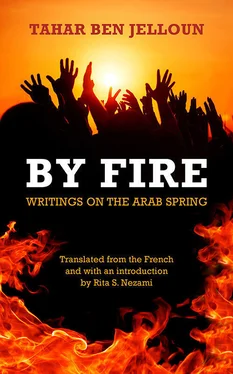Reading and Teaching By Fire
I read passages from By Fire at the American Literary Translator’s Association’s 2014 annual conference. As I read, my voice caught. Looking up at the audience, I saw tears in their eyes. I realized at that precise moment the power words can have over us. I also realized the importance of literary translation. There are urgent stories out there that need to be told in as many languages as possible and made available to world readers. I also read the translation at SUNY Stony Brook’s reading series. The university’s Poetry Center was packed with professors and students. I was moved by the pin-drop silence while the audience learned about Mohamed’s experience. For a moment, Mohamed was among us, and the audience could hear his voice. Many questions followed the reading. Perhaps because By Fire is based on a true story, it generates wide interest and has such a strong impact.
Reading the novella has had a strong effect on my students. They began writing research papers on the Arab Spring in January 2011 and have continued ever since. Their research turns up astonishing information about dictatorship, government corruption, police violence, and human rights abuses in the MENA region and elsewhere. Before reading By Fire , their essays were objective and journalistic reports. After spending time with the story, though, students write about corruption and human rights abuse with greater urgency, compassion, awareness, and concern. Bouazizi becomes more than a sterile historical figure; he is a devoted son, a caring brother, and a gentle lover, a man whom my students can understand and relate to.
Even so, I am intrigued that many of my students find fault with Mohamed’s behavior and choices. “If it was the only way to make a living and take care of his family,” they ask, “why didn’t he bribe the police?” After all, they point out, Bouazizi bribed a travel agent to get an air-ticket refund. By killing himself, Mohamed deprived his family of essential support, which these students see as stubborn, selfish, reckless, and weak. They don’t see him as a hero, but as a poor, desperate man whose self-immolation unwittingly triggered a revolt.
Some students do research on Ben Jelloun to understand more about why he wrote Bouazizi’s story in the first place. They often wonder whether his motivation lay in his two-year military camp detention. Perhaps it is there, they often suggest, that he learned what it is to suffer at the hands of corrupt police.
What matters most to me is that By Fire provokes my students to ask questions. They want to know more about the writer, the historical Mohamed Bouazizi, the region, and the Arab Spring. The work has sparked student interest not only in the historical figure, but also the historical and political reasons behind the unprecedented Arab Spring movement. They want to know what became of the movement and how it relates to contemporary conflicts in the Middle East, North Africa, and beyond. Students’ enthusiasm for engaging with Mohamed Bouazizi is the reason that my main objective in the classroom is generating their interest in global issues through global literature in English translation.
A Note on the Translation
After leaving the Paris bookstore with a copy of By Fire , I found a bench in Park Monceau and read the book without looking up. It was as though I did not even take a breath while I read. The sky had clouded over; it was already late afternoon. I closed the book and sat quietly for a while with my eyes closed, imagining those last few hours of Mohamed’s life. I heard his desperate voice and felt an unusual urgency for Anglophone readers to encounter Mohamed as soon as possible. Without moving from my bench, I took out paper and pen and began translating. As I worked, images from Mohamed’s life and death vividly unfolded before my eyes. Some of the passages left me trembling, breathless.
When I came across the following passage, Mohamed’s entire life, and then death, passed through my mind like sharp, clear snapshots:
A confused jumble of images rushed through his mind: His mother in bed, his father in his coffin, himself at the Faculty of Arts and Letters, Zineb smiling, Zineb angry, Zineb begging him not to do anything; his mother getting out of bed and calling for him; the face of the woman who had slapped him earlier, who slapped him again; his body bent forward as though he were offering himself to an executioner… his French teacher praising him; himself taking his college exams, showing his diploma to his parents; the diploma pinned to a sign beside the word unemployed ; his diploma burning in the sink at his place; his father’s burial again; screams; birds; the President and his wife wearing huge black sunglasses; the woman who had slapped him; the other who had insulted him… the police brutalizing him again; insults, blows, insults, blows…
I tried to imagine how he might have felt a moment before self-ignition. I decided to concentrate on Mohamed’s agonized voice that spoke to me; I wanted to translate his stream of thoughts during those last days of his life.
Beyond By Fire and The Spark , I have translated and published several other works by Tahar Ben Jelloun, including his autobiographical novel L’Ecrivain public ( The Public Scribe ) and several short stories. What appealed to me when I first read Ben Jelloun is his language. His poetic French, which is so characteristic of most of his work, however, is a dramatic contrast with the writer’s simple, direct, and straightforward language in By Fire . The plot moves fast, and so did my translation. Here, Ben Jelloun dispenses with superfluous details. Instead, he goes straight to the point. Nothing is left ambiguous, neither Mohamed’s life nor his death. The writer himself said in his interview with the New Yorker , “Obviously the style had to be simple, direct, dry. The subject didn’t allow for adjectives and flowers! I had to stick closely to the human being and to what he was going to do; I had to stay as close as I could to life and to death” (Treisman 2013).
Translating Mohamed’s life and death was a deeply emotional experience. Recreating the text in English was stimulating; from French it flowed effortlessly into English. Troublesome were certain French idiomatic expressions and slang words. A few other words and phrases were difficult to translate either because they are cognates with different meanings in French and English or because the concepts do not exist in English. The word concierge , used for the receptionist at the town hall, for example, has a different meaning in French than it does in English. I translated it as “man at the front desk,” or “the front-desk clerk.” I translated phrases like camarade de lute as “fellow activist,” un député de la majorité as “MP,” and des diplômés chômeurs as “unemployed graduates”—words and a concept not as widespread in the West as in the MENA region.
Another word is rial , which Ben Jelloun uses as the local currency in Par le feu . I found this odd when I first read the book. Rial is Iranian, Omani, and Yemeni currency, not Tunisian. Later, Ben Jelloun confirmed to me his intention of portraying his Mohamed as any Mohamed from any Arab country. Ben Jelloun uppercases P for President (which I have left in uppercase), even when not preceding a proper noun like Ben Ali. I believe his use of the uppercase P is to show the fear and reverence the characters feel, especially government officials, when they speak about their president. Overall, there are few untranslatable lexical choices or constructions in Par le feu , and even fewer in L’étincelle . In The Spark , Ben Ali says at one point, “Yes, I, the Raïs — I have cried.” The word Raïs is a title used by the rulers of Arab states in the Middle East. Though it is translated as “president,” I have kept the original word.
Читать дальше











![Anne Blunt - A Pilgrimage to Nejd, the Cradle of the Arab Race. Vol. 1 [of 2]](/books/749489/anne-blunt-a-pilgrimage-to-nejd-the-cradle-of-the-thumb.webp)
![Anne Blunt - A Pilgrimage to Nejd, the Cradle of the Arab Race. Vol. 2 [of 2]](/books/750183/anne-blunt-a-pilgrimage-to-nejd-the-cradle-of-the-thumb.webp)